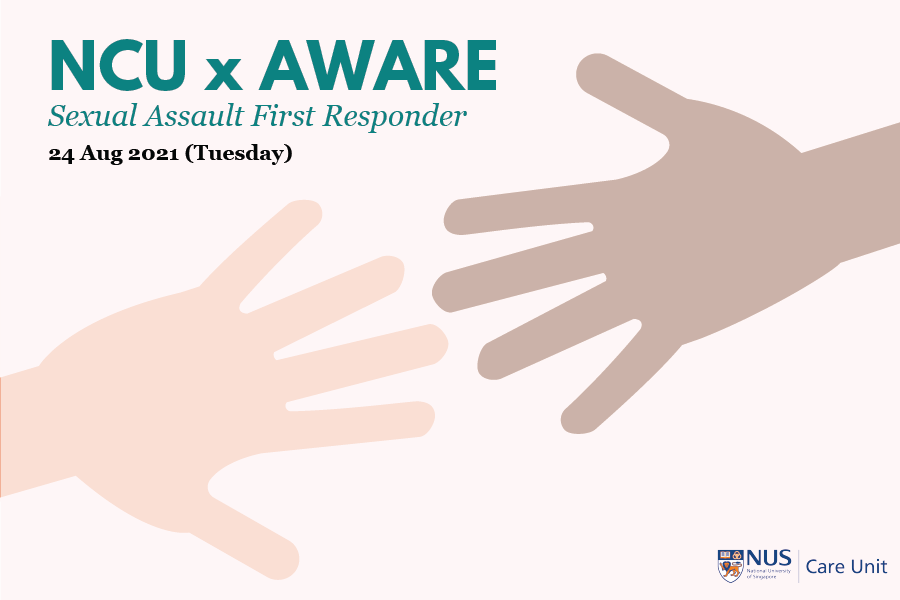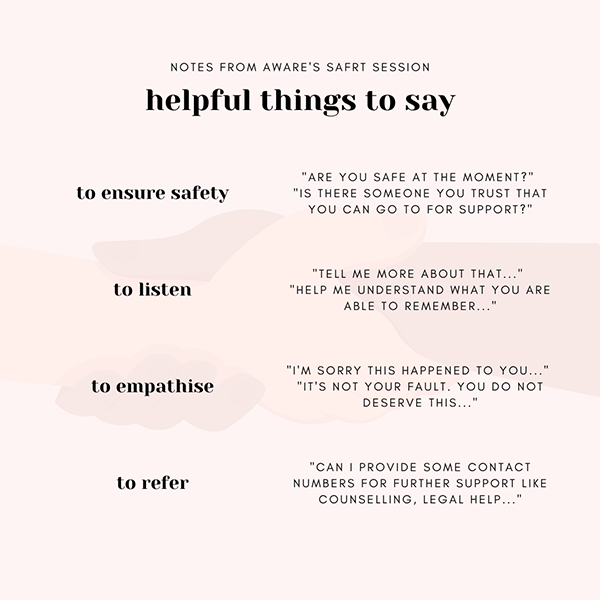19 Oct 2021 | Training

By: Vanessa Ow Yan Lin
When survivors first speak to someone about what has happened, the first responder’s actions and attitudes become critical in influencing how the survivor copes with their trauma.
Providing sensitive first response is pivotal in supporting survivors of sexual assault on their healing and recovery processes. On the flip side, negative first response informed by damaging sexual misconceptions could cause survivors to self-doubt or blame themselves for what has happened.
A Sexual Assault First Responder Training (SAFRT) session was co-organised by the NUS Care Unit (NCU) and the Association of Women for Action and Research (AWARE) using e-Voucher donations supported from the Campus Climate Survey 2020 (CCS2020). The SAFRT session held on 24 August 2021 was the second iteration in training student participants to become effective community first responders.
The 3-hour session saw participation from several student groups, including the NUS Student Union (NUSSU), the Office of Student Affairs’ (OSA) Peer Student Supporters (PSS), NUS Pro Bono Group (NUS PBG), and Students for a Safer NUS (safeNUS).
Led by experienced trainers Chie van Slobbe and Rayann Condy from AWARE’s Sexual Assault Care Centre (SACC), the session covered the importance of first response, common misconceptions and myths about sexual assault and consent, impact of trauma on survivors, and highlighted key steps first responders should take. “Sexual violence is one of the most damaging experiences a person can go through; it can deeply affect a person’s sense of safety and trust in the world,” remarked Chie.
The training equipped participants with the knowledge of the options and resources available for survivors, such as helplines for professional support, legal advice, or making non-legal reports. The session also involved role-playing based on case studies. Participants took turns to play the role of the first responder, reacting to the case studies, and thinking through the approach to take.
Altogether, the session was insightful with a welcoming and safe learning environment for the participants.

Aware of the sensitivity of first response and being mindful of what to say, it was not easy for participants who were practising for the first time. But the 4-step guide (Safety, Listen, Emphathise, and Refer) taught by the trainers was helpful in recalling crucial steps in first response.
A key takeaway is the importance of empowering survivors to make their own decisions instead of taking action for them. First responders can feel anger and injustice for survivors and want to seek legal actions against the assaulter, but it is crucial to enable survivors to make their own choices instead.
The key role of the first responder is to inform survivors of options and resources available to them, and to empower and support them in their choices without judgement. Allowing survivors to make their own decisions supports them in regaining their sense of control and agency.
If you or someone you know is affected by sexual misconduct, please reach out to NCU for support by calling our sexual misconduct helpline (+65 6601 4000) or emailing us at ncu_help@nus.edu.sg.

